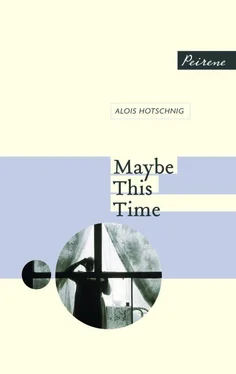Alois Hotschnig - Maybe This Time
Здесь есть возможность читать онлайн «Alois Hotschnig - Maybe This Time» весь текст электронной книги совершенно бесплатно (целиком полную версию без сокращений). В некоторых случаях можно слушать аудио, скачать через торрент в формате fb2 и присутствует краткое содержание. Год выпуска: 2011, Издательство: Peirene Press, Жанр: Современная проза, на английском языке. Описание произведения, (предисловие) а так же отзывы посетителей доступны на портале библиотеки ЛибКат.
- Название:Maybe This Time
- Автор:
- Издательство:Peirene Press
- Жанр:
- Год:2011
- ISBN:нет данных
- Рейтинг книги:4 / 5. Голосов: 1
-
Избранное:Добавить в избранное
- Отзывы:
-
Ваша оценка:
- 80
- 1
- 2
- 3
- 4
- 5
Maybe This Time: краткое содержание, описание и аннотация
Предлагаем к чтению аннотацию, описание, краткое содержание или предисловие (зависит от того, что написал сам автор книги «Maybe This Time»). Если вы не нашли необходимую информацию о книге — напишите в комментариях, мы постараемся отыскать её.
Maybe This Time — читать онлайн бесплатно полную книгу (весь текст) целиком
Ниже представлен текст книги, разбитый по страницам. Система сохранения места последней прочитанной страницы, позволяет с удобством читать онлайн бесплатно книгу «Maybe This Time», без необходимости каждый раз заново искать на чём Вы остановились. Поставьте закладку, и сможете в любой момент перейти на страницу, на которой закончили чтение.
Интервал:
Закладка:
Raking the reeds seemed to calm him. When the young man lay with the couple on the jetty the next morning, he was placed between them. The young man lay on his back while they lay facing him, until they turned away. Not a single word more than usual was spoken. There was only the creaking of the chairs, nothing else until evening. Then the young man left.
The more absorbed I became with my neighbours and the more my life merged into theirs, the fewer visitors I had. If one of my friends asked about them, I found it hard to remain calm and respond appropriately. I was too preoccupied with them and afraid to expose them to the curiosity of others.
I distanced myself from the few friends who hadn’t already given up on me. I never went out any more. If a friend’s visit couldn’t be avoided, it was agony for me not to talk about my neighbours and follow a different conversation.
I began inventing stories about them to make their idleness more bearable, personal histories that might explain what had brought them to their current state, lying there before me on that jetty. The stories became more inventive as my own life grew increasingly monotonous. Eventually I had to admit that for a long time I had been lying there with them on the jetty, and that my pretended busyness and feigned familiarity with these people was simply an attempt to escape my own life.
My attitude clearly had to change. But I didn’t know how to get away from these two. I simply didn’t exist for them, and that is how they hooked me. They refused contact, yet they willingly exposed themselves to me. I had caught the scent of their lives, which obviously had reached some sort of premature end. I had fed on them, devoured them, and now I wanted more. I couldn’t resist absorbing their most fleeting emotions as my own, and so I carried them inside me and I lived out their disquiet, which was also my disquiet.
I protected myself by writing everything down, by recording whatever I observed, when they went into the water and when they left the jetty. I noted it all down. Finally I began taking pictures of them. Now I could look at them at night too. This way they were always available to me.
I spent most of the time on my jetty and in my boat and in the rooms inside my house which gave a clear view of them. The reports on their daily routine complemented my own. They lay on their deckchairs, I paced back and forth at home watching them. The more I learned about them, the less I was able to tear myself away.
Ashamed at first, I only photographed them furtively from inside my house. I didn’t want them to see what I was doing. Then I swam along the shore, each time venturing a little closer. They didn’t seem to mind, although it was impossible that they didn’t notice me. But they let it happen. They pretended they simply didn’t see me, even when I rowed past and took pictures of them from my boat.
Before dawn, the man brought out the pot of lobelias and set it on the shelf. He plucked the wilted leaves and flowers and scattered them expansively over the lake. Then he brought out the deckchairs and placed them in their proper positions, and the woman covered them with blankets so that the jetty became an altar. The sun rose and the woman lay down on her chair, where she would spend this day too, and the man went down the steps into the water and waded through the reeds. After a while, he took a rake into the water and moved it back and forth over the bed of the lake as if he were ploughing a field. He raked the ground with devotion and straightened the reeds, though a single gust of wind would undo his work. When he had finished, he disappeared and returned with a child’s watering can. He filled it with lake water which he sprinkled on the pot of lobelias.
Exactly what kind of ritual I was witnessing I could not tell. Yet I was there every day, despite myself, craving the sight of it.
I constantly took pictures of them. I now wanted them to acknowledge my interest. I was determined that they should see me. This, too, they tolerated, and so I couldn’t escape them. My only option was to imitate them, to let them see me copying everything they did. I cleaned and scrubbed my jetty and raked the reeds and swept the mud under the water. I pulled spiders’ webs off the branches of my shrubs and pruned their withered leaves. Before, I had been a night owl, but now when they appeared at the crack of dawn, I was already lying in wait.
We looked at the same view, heard the same noises. We shared a common world and were separated by it. Great crested grebes nested in the reeds, ducks landed near them and near me. In the noise of children from the nearby swimming pool, my own childhood called to me. The same silence, the same noise. So much surrounded us, the waves, the fishermen going about their business out on the lake, and the water, the shore, the reeds. Did they see all this, I wondered, and if so, what did they make of it all?
I sat on my jetty and stared over at them, only to see them staring into the reeds. They were like two beetles that had fallen on their backs, with no desire to be on their feet again. When I left my jetty after a long day, I went into the house and closed the door behind me, and closed the shutters and the curtains, and turned off the light. It was dark and I closed my eyes but I still saw them in their spot, in the sun, in the rain, in the cold and wind, as if they had become one with their deckchairs. One day, they would lie on those chairs forever. As I lay in my bed, I thought about them lying there and, through them, about my own situation. Because no matter how obsessed I had become, I had really only stalked myself. In truth, it was myself I was now looking at, and I realized that if I kept watching them, that is what I would become.
Now I often dreamed of swimming out into the lake and letting myself drift away, anywhere the water would take me. I would lie amidst the driftwood, between the stones and the willows, buoyed by the waves. The water would be cold but I wouldn’t feel it, nor would I feel the stones that chafed my body and rubbed it raw. I would have no sense of anything, no sound, just the wind in the willow branches and the stillness. I would drift on the water without moving, another piece of wood among many, a log like any other, worn smooth by the stones, adrift on the current and at peace with what has been and what is.
I woke from the dream with a start and knew I had to do something. I remembered the house’s previous tenant and how happy he had been to find a replacement and get away from the area. I looked him up. He was a friendly man who refused to say a word about my neighbours.
You don’t have to stay, he said. You can always try leaving. I have a pretty good idea of how difficult that might be, though.
And so I was on my own again. I often considered moving away, but until I understood what kept me tied to the place and what I was seeing, I couldn’t leave. That much, in any case, was clear. No one would help me and I knew that I had to cope with my neighbours on my own.
For months I had wanted to swim over to their jetty. I wanted to look around the place from which these people held such sway over me, to lie on their deckchairs and to see it all from their perspective for once. I decided to do it. I climbed into the water and made my way through the reeds. Dawn had not yet broken, and in the darkness I realized how badly I had misjudged the distance. I kept sinking and stepping into holes, suddenly losing my footing. I used the reeds to pull myself up again. I felt my way, like a blind man. Every few metres, I found myself reaching through slime floating on the water, which I had never noticed before. It obstructed my way and I soon noted that it grew up from the depths of the lake. I cursed myself for pursuing these people. After all, they hadn’t done me the slightest harm. But I had gone too far by now to turn back. In any case, I was determined to reach their jetty and so struggled on. When the lake bed fell away or I sank into the mud, I held on to the reeds and pulled myself back up. The more I fought and grabbed and flailed about, the more entangled I became in the slimy growth like in a net that tightened around me with every step.
Читать дальшеИнтервал:
Закладка:
Похожие книги на «Maybe This Time»
Представляем Вашему вниманию похожие книги на «Maybe This Time» списком для выбора. Мы отобрали схожую по названию и смыслу литературу в надежде предоставить читателям больше вариантов отыскать новые, интересные, ещё непрочитанные произведения.
Обсуждение, отзывы о книге «Maybe This Time» и просто собственные мнения читателей. Оставьте ваши комментарии, напишите, что Вы думаете о произведении, его смысле или главных героях. Укажите что конкретно понравилось, а что нет, и почему Вы так считаете.












